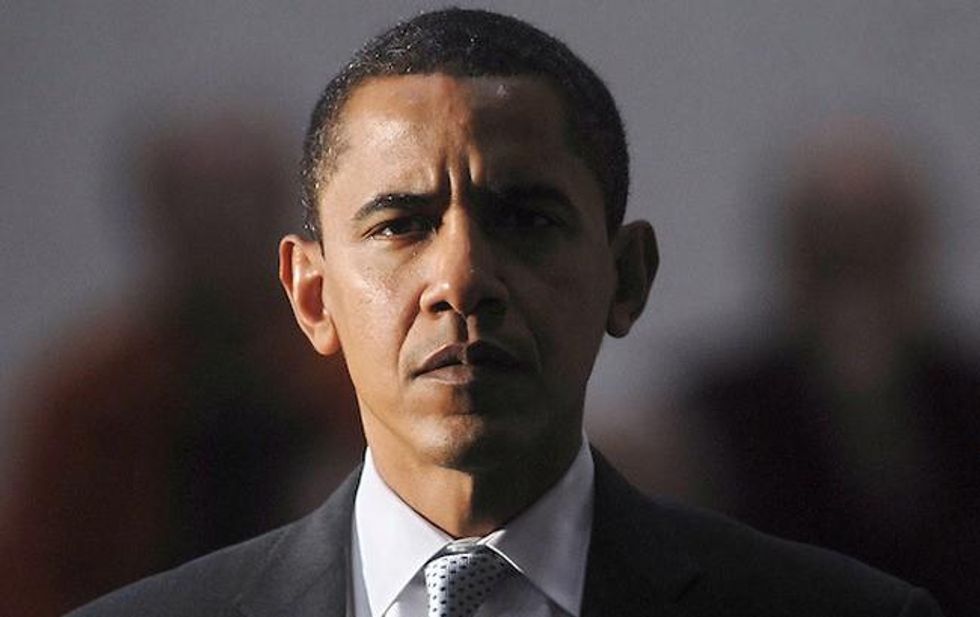Jul 24, 2013

Critics slam the hypocrisy of invoking transparency to defend a secret spying program given free reign in closed-door NSA meetings and FISA courts and conducted without the consent of millions of people caught in the surveillance dragnet.

The White House released a statement Tuesday declaring, "[W]e oppose the current effort in the House to hastily dismantle one of our Intelligence Community's counterterrorism tools. This blunt approach is not the product of an informed, open, or deliberative process."
Guardian journalist Glenn Greenwald--who broke the story on secret spying exposed by NSA whistleblower Edward Snowden--was quick to seize on the irony of the White House statement on Twitter.
Meanwhile, Senator Ron Wyden warned that the NSA spying program has a staggeringly far reach with no real accountability. Addressing an event hosted by the Center for American Progress Action Fund on Tuesday, he warned:
The combination of increasingly advanced technology with a breakdown in the checks and balances that limit government action could lead us to a surveillance state that cannot be reversed.
The legislative measure, introduced to the House by Michigan Republican Justin Amash, is aimed at preventing the NSA from accessing millions of US phone records without consent. This will be the first vote in Congress to curb the NSA's secret spying powers since the scandal erupted, and it has garnered bipartisan support.
The Wednesday congressional debate--with a vote expected Wednesday or Thursday--comes just days after secret courts reapproved the phone data collection program Friday. The Obama Administration has fiercely defended the spying and lobbied against any proposed curbs, and NSA Director General Keith Alexander held an emergency closed-door briefing with Congress on Tuesday to forcefully urge rejection of the proposed amendment.
Yet, the Obama Administration has been unable to contain mounting public outrage at the secret spying now making its way to Congress.
"The public was not just kept in the dark about the Patriot Act and other secret authorities," Wyden said. "The public was actively misled."
_____________________
Why Your Ongoing Support Is Essential
Donald Trump’s attacks on democracy, justice, and a free press are escalating — putting everything we stand for at risk. We believe a better world is possible, but we can’t get there without your support. Common Dreams stands apart. We answer only to you — our readers, activists, and changemakers — not to billionaires or corporations. Our independence allows us to cover the vital stories that others won’t, spotlighting movements for peace, equality, and human rights. Right now, our work faces unprecedented challenges. Misinformation is spreading, journalists are under attack, and financial pressures are mounting. As a reader-supported, nonprofit newsroom, your support is crucial to keep this journalism alive. Whatever you can give — $10, $25, or $100 — helps us stay strong and responsive when the world needs us most. Together, we’ll continue to build the independent, courageous journalism our movement relies on. Thank you for being part of this community. |
Our work is licensed under Creative Commons (CC BY-NC-ND 3.0). Feel free to republish and share widely.
Sarah Lazare
Sarah Lazare was a staff writer for Common Dreams from 2013-2016. She is currently web editor and reporter for In These Times.

Critics slam the hypocrisy of invoking transparency to defend a secret spying program given free reign in closed-door NSA meetings and FISA courts and conducted without the consent of millions of people caught in the surveillance dragnet.

The White House released a statement Tuesday declaring, "[W]e oppose the current effort in the House to hastily dismantle one of our Intelligence Community's counterterrorism tools. This blunt approach is not the product of an informed, open, or deliberative process."
Guardian journalist Glenn Greenwald--who broke the story on secret spying exposed by NSA whistleblower Edward Snowden--was quick to seize on the irony of the White House statement on Twitter.
Meanwhile, Senator Ron Wyden warned that the NSA spying program has a staggeringly far reach with no real accountability. Addressing an event hosted by the Center for American Progress Action Fund on Tuesday, he warned:
The combination of increasingly advanced technology with a breakdown in the checks and balances that limit government action could lead us to a surveillance state that cannot be reversed.
The legislative measure, introduced to the House by Michigan Republican Justin Amash, is aimed at preventing the NSA from accessing millions of US phone records without consent. This will be the first vote in Congress to curb the NSA's secret spying powers since the scandal erupted, and it has garnered bipartisan support.
The Wednesday congressional debate--with a vote expected Wednesday or Thursday--comes just days after secret courts reapproved the phone data collection program Friday. The Obama Administration has fiercely defended the spying and lobbied against any proposed curbs, and NSA Director General Keith Alexander held an emergency closed-door briefing with Congress on Tuesday to forcefully urge rejection of the proposed amendment.
Yet, the Obama Administration has been unable to contain mounting public outrage at the secret spying now making its way to Congress.
"The public was not just kept in the dark about the Patriot Act and other secret authorities," Wyden said. "The public was actively misled."
_____________________
Sarah Lazare
Sarah Lazare was a staff writer for Common Dreams from 2013-2016. She is currently web editor and reporter for In These Times.

Critics slam the hypocrisy of invoking transparency to defend a secret spying program given free reign in closed-door NSA meetings and FISA courts and conducted without the consent of millions of people caught in the surveillance dragnet.

The White House released a statement Tuesday declaring, "[W]e oppose the current effort in the House to hastily dismantle one of our Intelligence Community's counterterrorism tools. This blunt approach is not the product of an informed, open, or deliberative process."
Guardian journalist Glenn Greenwald--who broke the story on secret spying exposed by NSA whistleblower Edward Snowden--was quick to seize on the irony of the White House statement on Twitter.
Meanwhile, Senator Ron Wyden warned that the NSA spying program has a staggeringly far reach with no real accountability. Addressing an event hosted by the Center for American Progress Action Fund on Tuesday, he warned:
The combination of increasingly advanced technology with a breakdown in the checks and balances that limit government action could lead us to a surveillance state that cannot be reversed.
The legislative measure, introduced to the House by Michigan Republican Justin Amash, is aimed at preventing the NSA from accessing millions of US phone records without consent. This will be the first vote in Congress to curb the NSA's secret spying powers since the scandal erupted, and it has garnered bipartisan support.
The Wednesday congressional debate--with a vote expected Wednesday or Thursday--comes just days after secret courts reapproved the phone data collection program Friday. The Obama Administration has fiercely defended the spying and lobbied against any proposed curbs, and NSA Director General Keith Alexander held an emergency closed-door briefing with Congress on Tuesday to forcefully urge rejection of the proposed amendment.
Yet, the Obama Administration has been unable to contain mounting public outrage at the secret spying now making its way to Congress.
"The public was not just kept in the dark about the Patriot Act and other secret authorities," Wyden said. "The public was actively misled."
_____________________
We've had enough. The 1% own and operate the corporate media. They are doing everything they can to defend the status quo, squash dissent and protect the wealthy and the powerful. The Common Dreams media model is different. We cover the news that matters to the 99%. Our mission? To inform. To inspire. To ignite change for the common good. How? Nonprofit. Independent. Reader-supported. Free to read. Free to republish. Free to share. With no advertising. No paywalls. No selling of your data. Thousands of small donations fund our newsroom and allow us to continue publishing. Can you chip in? We can't do it without you. Thank you.